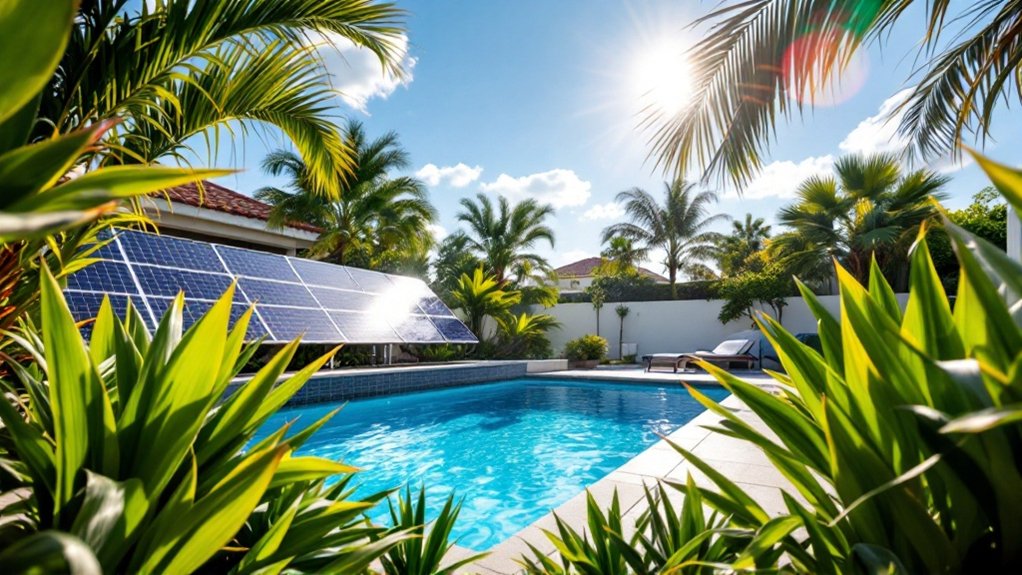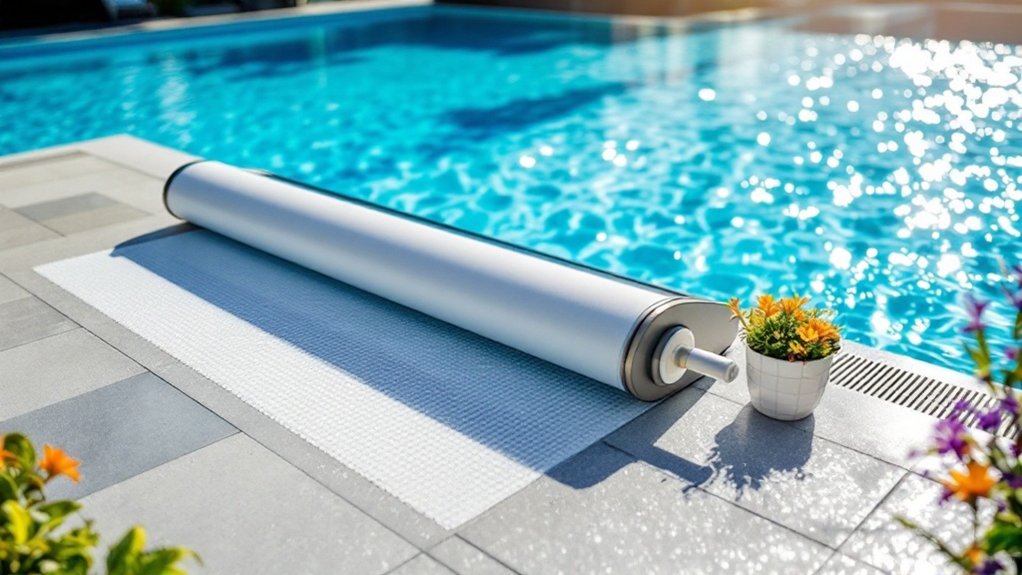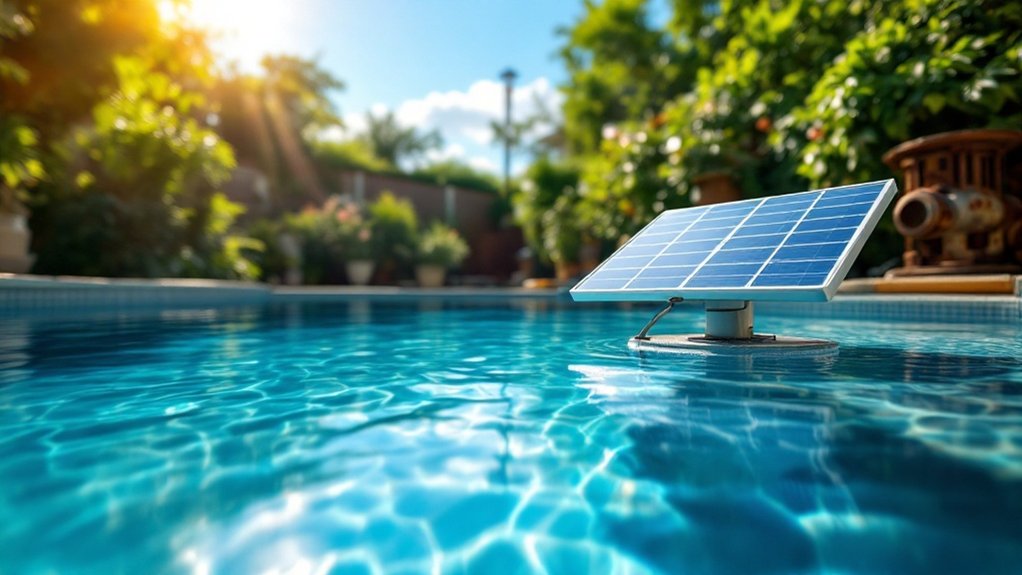Sustainable pool designs are increasingly relevant in today’s eco-conscious society. These pools incorporate features that minimize environmental impact while maintaining functionality. A key aspect of these designs is the use of biodegradable cleaners. These products promise effective maintenance without the harmful effects of traditional chemicals. Understanding how these elements work together can reveal new possibilities for eco-friendly enjoyment. What specific innovations are transforming the landscape of sustainable pool ownership?
The Importance of Sustainable Pool Design
As environmental concerns continue to rise, the significance of sustainable pool design becomes increasingly evident. Traditional pool designs often rely on energy-intensive systems and harsh chemicals, contributing to ecological degradation. In contrast, sustainable pool design prioritizes eco-friendliness, aiming to minimize water usage, reduce energy consumption, and limit harmful chemical exposure. By incorporating natural filtration systems and renewable energy sources, such as solar heating, these pools effectively reduce their carbon footprint. Additionally, sustainable designs often emphasize local materials and landscaping to enhance biodiversity and reduce transportation emissions. By prioritizing sustainability, pool owners can contribute positively to their surroundings, ensuring that their leisure activities do not come at the expense of the environment. This shift towards eco-conscious practices reflects a growing commitment to sustainable living. Furthermore, proper planning and consultation can significantly improve the feasibility and effectiveness of sustainable pool designs.
Key Features of Eco-Friendly Pools
Eco-friendly pools incorporate several key features that enhance their sustainability while providing a pleasant swimming experience. One significant aspect is energy-efficient heating systems, which utilize solar panels or heat pumps to minimize energy consumption. Additionally, these pools often include advanced filtration systems that require fewer chemicals, reducing environmental impact. Incorporation of natural landscaping around the pool helps maintain local ecosystems and provides natural shade. Water conservation measures, such as rainwater harvesting and efficient circulation systems, also enhance sustainability. Moreover, eco-friendly pools prioritize safety by integrating non-toxic materials and finishes, ensuring a healthier environment for swimmers. Regular equipment maintenance is crucial to ensure the longevity and efficiency of these eco-friendly systems. Overall, these features collectively contribute to a responsible approach to pool design, marrying functionality with environmental mindfulness.
Innovative Materials for Sustainable Pool Construction
In the quest for sustainable pool construction, innovative materials play a vital role. Recycled building materials and natural stone options offer environmentally friendly alternatives that reduce waste and enhance aesthetic appeal. These choices not only contribute to sustainability but also promote a harmonious relationship with the surrounding environment.
Recycled Building Materials
Utilizing recycled building materials in pool construction not only reduces environmental impact but also introduces innovative design possibilities. Reclaimed wood, for instance, can be utilized for decking and seating areas, providing a rustic charm while minimizing deforestation. Recycled glass tiles can add vibrant colors and textures to pool interiors, showcasing eco-friendly elegance. Additionally, using repurposed concrete helps in creating durable pool structures, reducing the demand for new materials. These materials not only contribute to sustainability but also allow for unique aesthetic expressions that differentiate pools from conventional designs. By incorporating recycled components, pool builders can achieve both functionality and visual appeal, promoting a greener approach to aquatic leisure spaces while inspiring homeowners to make environmentally conscious choices.
Natural Stone Options
Recycled building materials pave the way for exploring other sustainable options, including natural stone, which offers both durability and aesthetic appeal in pool construction. Natural stone, such as granite, slate, and limestone, is not only long-lasting but also harmonizes with the environment, enhancing the landscape’s beauty. Sourced responsibly, these materials minimize ecological impact, as they often require less energy to extract and process compared to synthetic alternatives. Additionally, natural stone’s inherent thermal properties help regulate pool temperatures, reducing energy consumption. The unique textures and colors available in natural stone allow for customization, making each pool design distinct. Overall, choosing natural stone is a viable option for those seeking a sustainable and visually engaging pool environment.
Biodegradable Cleaners: Benefits and Options
As pool owners increasingly prioritize sustainability, biodegradable cleaners have emerged as a compelling alternative to traditional chemical products. These eco-friendly options offer numerous benefits, including reduced environmental impact and improved safety for swimmers and wildlife. Unlike conventional cleaners, biodegradable alternatives break down naturally, minimizing chemical runoff into surrounding ecosystems.
Popular options include vinegar, baking soda, and citrus-based cleaners, which effectively combat algae and grime without harmful residues. Additionally, many biodegradable products are free from phosphates and harsh chemicals, making them safer for both users and the environment. By choosing biodegradable cleaners, pool owners can maintain their pools while aligning with eco-conscious values, promoting a healthier planet and contributing to a sustainable lifestyle.
Maintenance Tips for Eco-Conscious Pool Owners
While maintaining a pool can seem intimidating, eco-conscious owners can adopt several strategies to guarantee their pools remain clean and sustainable. Regularly testing water chemistry helps confirm proper balance, reducing the need for excessive chemicals. Utilizing a pool cover minimizes evaporation and debris accumulation, cutting down on cleaning time and energy costs. Eco-friendly filtration systems, such as those using sand or diatomaceous earth, can enhance efficiency while being gentler on the environment. Additionally, incorporating natural landscaping around the pool can aid in filtration and reduce runoff. Finally, scheduling routine maintenance with a focus on sustainable practices confirms longevity while preserving water quality. By implementing these strategies, eco-conscious pool owners can maintain their pools effectively and responsibly. Regular pipe cleaning is also essential to prevent clogs and improve water quality.
Inspiring Sustainable Pool Design Ideas
Sustainable pool design can be greatly enhanced through the thoughtful selection of eco-friendly materials and the integration of energy-efficient systems. These choices not only reduce environmental impact but also promote long-term cost savings for homeowners. Exploring innovative ideas in these areas can inspire a new generation of sustainable pools.
Eco-Friendly Materials Selection
Many homeowners are increasingly prioritizing eco-friendly materials in their pool designs to create environmentally conscious outdoor spaces. Sustainable options, such as recycled glass tiles and natural stone, not only enhance the aesthetic appeal but also reduce the environmental footprint. Additionally, using responsibly sourced wood for decking and furniture contributes to sustainability while offering durability. Non-toxic, biodegradable sealants and finishes guarantee that the pool’s maintenance does not introduce harmful chemicals into the surrounding ecosystem. Moreover, incorporating permeable paving stones allows for better water drainage and minimizes runoff. By selecting these eco-friendly materials, homeowners can achieve a harmonious balance between luxury and sustainability, ultimately fostering an outdoor environment that respects nature and promotes wellness.
Energy-Efficient Pool Systems
The integration of energy-efficient pool systems represents a notable advancement in sustainable pool design, complementing the use of eco-friendly materials. These systems utilize advanced technology to minimize energy consumption while maintaining peak performance. Variable-speed pumps, for instance, adjust their speed according to the pool’s needs, greatly reducing electricity usage compared to traditional pumps. Solar heating systems harness renewable energy, providing warmth without relying on fossil fuels. Additionally, LED lighting offers a sustainable alternative to conventional lighting, consuming less energy and lasting longer. Automated controls can enhance filtration schedules, further improving energy efficiency. By incorporating these innovative systems, pool owners can enjoy a luxurious experience while minimizing their environmental impact, aligning leisure with sustainability.
Frequently Asked Questions
How Can I Reduce My Pool’s Water Consumption Sustainably?
To reduce a pool’s water consumption sustainably, one can implement strategies such as using a pool cover, practicing efficient filtration methods, opting for drought-resistant landscaping, and regularly checking for leaks to minimize evaporation and water loss.
Are There Specific Plants That Enhance Pool Sustainability?
The inquiry regarding specific plants that enhance pool sustainability reveals that native aquatic plants, such as water lilies and cattails, improve water quality and biodiversity while requiring less maintenance, contributing positively to the overall ecosystem.
What Are the Best Energy-Efficient Pool Heating Options?
The best energy-efficient pool heating options include solar heaters, heat pumps, and gas heaters. Each method varies in efficiency and initial cost, allowing pool owners to choose according to their budget and environmental preferences.
How Do Biodegradable Cleaners Compare in Cost to Traditional Cleaners?
Biodegradable cleaners often have a higher upfront cost compared to traditional cleaners. However, their long-term benefits, including environmental impact and health considerations, may justify the investment for environmentally-conscious consumers seeking sustainable cleaning solutions.
Can I Install a Sustainable Pool in a Small Backyard?
He wondered if a sustainable pool could fit in his small backyard. Experts confirmed that innovative designs and compact options exist, allowing homeowners to create eco-friendly pools without sacrificing space or aesthetics in limited areas.
Conclusion
In summary, sustainable pool designs that incorporate biodegradable cleaners represent a significant step towards eco-friendly living. By prioritizing natural ingredients and innovative features, pool owners can create beautiful and functional outdoor spaces that minimize environmental impact. Embracing these practices not only enhances the aesthetic appeal of pools but also promotes a healthier ecosystem. As awareness of sustainable living grows, more individuals are likely to adopt these eco-conscious approaches, fostering a more sustainable future for leisure and recreation.




